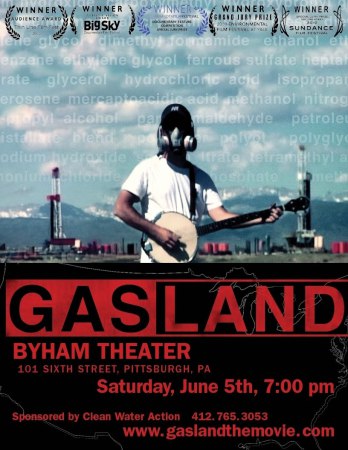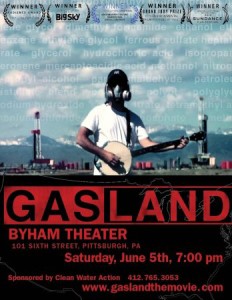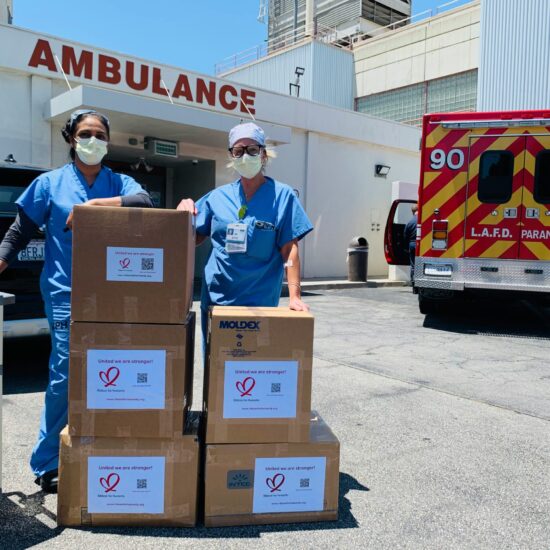
This post was written by Jennifer De Jesus a student in the Macaulay Honors College at Hunter and an avid movie watcher. She is also an employee of the Health Professions Education Center, which has one of the largest collection of health films in the New York City area.
“Gasland”
 Fracking is coming to New York State—and many people think that means that we need to prepare for contaminated water, air pollution, and a myriad of health problems. All of these issues have been outcomes at various fracking sites; effects New York officials want to minimize, as the state prepare to issue permits next year. The New York State Department of Environmental Conservation is accepting feedback from the public until December 12th on the Supplemental Generic Environmental Impact Statement, their proposed rules on regulating fracking and possible environmental consequences.
Fracking is coming to New York State—and many people think that means that we need to prepare for contaminated water, air pollution, and a myriad of health problems. All of these issues have been outcomes at various fracking sites; effects New York officials want to minimize, as the state prepare to issue permits next year. The New York State Department of Environmental Conservation is accepting feedback from the public until December 12th on the Supplemental Generic Environmental Impact Statement, their proposed rules on regulating fracking and possible environmental consequences.
Originally invented by Halliburton—whose CEO was former Vice President Dick Cheney—fracking involves the injection of chemicals (some of them toxic) into the ground, releasing natural gas. The method is also completely unregulated; through a stipulation called the Halliburton Loophole, of the 2005 Energy Policy Act, inserted on the behalf of Dick Cheney. The Halliburton Loophole excuses the process of fracking from observing the Clean Air Act, Clean Water Act and the Safe Drinking Water Act. The sheer fact, however, that this stipulation exists is enough to question the veracity of Halliburton’s claims about its practices being safe.
What prompted New York’s cautious approach to hydraulic fracturing, however, has been the visibility of this issue in the media, largely the result of the scathing documentary “Gasland”; a film created when Josh Fox was offered $100,000 for the gas rights to his property in Pennsylvania and his search for more information about fracking. Fox travelled to 34 states, talking to property owners and environmental experts about the effects of extracting natural gas. One of the most memorable effects portrayed in the film and shared by almost all the property owners living next to a gas extraction site—was flammable water. Putting lighters next to faucets, owners disproved gas ‘safety’ claims as their water lit up within seconds.
With the rise in oil prices, energy companies are increasingly pressured to find alternative, cleaner, and sustainable fuel. It is because of this pressure that many companies, like corporation giant Exxon Mobil, are turning more of their attention to natural gas—which is affordable, 60% cleaner than coal, and readily available in the United States. However the process of extracting natural gas, has been linked to lung and brain damage, a decrease in the biodiversity of an area, the contamination of the air….the list continues. Yet the fracking industry is not solely responsible for these environmental and health issues: farmers that have been financially struggling are eager to sign away their gas rights, profiting at the cost of the land.
No better link exists between policy and health than “Gasland”, which clearly demonstrates how policies and politics (Cheney’s role in the Halliburton’s Loophole) affect the health of everyday people. This Emmy award winning documentary also emphasizes the media’s power in the discussion of health issues, giving certain issues national attention, affecting how they are addressed—as can be seen presently in New York.








Peggy Rafferty / September 27, 2011
This is not a theoretical issue. The New York City Council member James Gennaro held hearings last week. One very big problem is that the buffer zone around the NYC watershed is inadequate. (This was also the subject of a New York Times editorial last week) Al Appleton testified that the blasting/drilling near the NYC water system could cause the 100 year old pipes to break. We could wake up one morning to find half of the NYC water supply unavailable. The mixture used to drill also contains hundreds of chemicals. If this migrates into our water system it will be a big problem.
/
Pingback: I Showed the Documentary, Gasland, Today - Pilant's Business Ethics | Pilant's Business Ethics / November 9, 2011
/